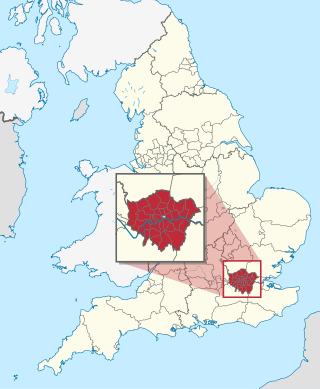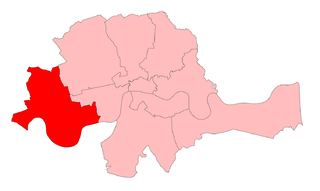Related Research Articles

The London boroughs are the current 32 local authority districts that together with the City of London make up the administrative area of Greater London, England; each is governed by a London borough council. The present London boroughs were all created at the same time as Greater London on 1 April 1965 by the London Government Act 1963 and are a type of local government district. Twelve were designated as Inner London boroughs and twenty as Outer London boroughs. The City of London, the historic centre, is a separate ceremonial county and sui generis local government district that functions quite differently from a London borough. However, the two counties together comprise the administrative area of Greater London as well as the London Region, all of which is also governed by the Greater London Authority, under the Mayor of London.

The politics of Scotland operate within the constitution of the United Kingdom, of which Scotland is a country. Scotland is a democracy, being represented in both the Scottish Parliament and the Parliament of the United Kingdom since the Scotland Act 1998. Most executive power is exercised by the Scottish Government, led by the first minister of Scotland, the head of government in a multi-party system. The judiciary of Scotland, dealing with Scots law, is independent of the legislature and the Scottish Government, and is headed by the Lord Advocate who is the principal legal adviser to the Scottish Government. Scots law is primarily determined by the Scottish Parliament. The Scottish Government shares limited executive powers, notably over reserved matters, with the Scotland Office, a British government department led by the Secretary of State for Scotland.

Southern Rhodesia was a landlocked, self-governing British Crown colony in Southern Africa, established in 1923 and consisting of British South Africa Company (BSAC) territories lying south of the Zambezi River. The region was informally known as South Zambesia until annexation by Britain, at the behest of Cecil Rhodes's British South Africa Company. The bounding territories were Bechuanaland (Botswana), Northern Rhodesia (Zambia), Portuguese Mozambique (Mozambique) and the Transvaal Republic.
An alderman is a member of a municipal assembly or council in many jurisdictions founded upon English law with similar officials existing in the Netherlands (wethouder) and Belgium (schepen). The term may be titular, denoting a high-ranking member of a borough or county council, a council member chosen by the elected members themselves rather than by popular vote, or a council member elected by voters.

The 1966 United Kingdom general election was held on Thursday 31 March 1966. The result was a landslide victory for the Labour Party led by Prime Minister Harold Wilson.

Referendums in the United Kingdom are occasionally held at a national, regional or local level. Historically, national referendums are rare due to the long-standing principle of parliamentary sovereignty. Legally there is no constitutional requirement to hold a national referendum for any purpose or on any issue. However, the UK Parliament is free to legislate through an Act of Parliament for a referendum to be held on any question at any time.
Elections in Northern Ireland are held on a regular basis to local councils, the Northern Ireland Assembly and to the Parliament of the United Kingdom.

Chelsea was a borough constituency, represented in the House of Commons of the Parliament of the United Kingdom.
Barons Court was a constituency of the House of Commons of the Parliament of the United Kingdom from 1955 to 1974. It was represented by one Member of Parliament (MP), elected by the first-past-the-post system of election.
Stepney was a parliamentary constituency centred on the Stepney district of the East End of London. It returned one Member of Parliament (MP) to the House of Commons of the Parliament of the United Kingdom, elected by the first past the post system.

Hampstead was a borough constituency, centered on the Hampstead area of North London. It returned one Member of Parliament (MP) to the House of Commons of the Parliament of the United Kingdom, who was elected using the first-past-the-post voting system.

The Legislative Assembly of the State of Singapore was the legislature of the Government of Singapore from 1955 to 1965 and is the predecessor of the Parliament of Singapore. The Rendel Constitution, proposed in 1953, sought to give the local population more self-governance as the Merdeka independence movement grew. The Constitution took effect upon the conclusion of the 1955 general election, creating the new Legislative Assembly to replace the Legislative Council of Singapore. In contrast to the Legislative Council, the majority of seats in the Legislative Assembly in 1955 were allotted by election rather than appointment by the British colonial government. 25 seats were elected and 7 were appointed. The British colonial government still reserved significant power, such as that of veto and control of certain aspects of the government.
Carshalton was a constituency combining with areas to the south-west, then to the east instead, Carshalton which is a suburb on a long, north–south hillside south of London. The latter form saw it take up an eastern "half" of the London Borough of Sutton. It returned one Member of Parliament (MP) to the House of Commons of the Parliament of the United Kingdom.
Merton and Morden was a parliamentary constituency in what was then the Merton and Morden Urban District in Surrey, but in major local government boundary changes in 1965 became part of the London Borough of Merton in Greater London. It returned one Member of Parliament (MP) to the House of Commons of the Parliament of the United Kingdom, elected by the first past the post system.

The 2014 Bromley London Borough Council election took place on 22 May 2014. All 60 members of Bromley London Borough Council were elected. The elections took place alongside local elections in the other London boroughs, elections to local authorities across the United Kingdom, and elections to the European Parliament.

Elections to the municipal and county councils of England and Wales were held in 1889. Elections to the various county councils were held in January 1889. Progressive candidates won a majority on London County Council, although at this point party labels were relatively unimportant, with municipal and county politics in Victorian Britain being somewhat detached from national politics, and national political divisions. Liberal candidates would do particularly well in Wales however, winning clear majorities in 11 of Wales' 13 counties. The Liberals only failed to take Brecknockshire and Radnorshire, which had hung councils. In the English counties the Liberals took only Cumberland, Holland, London, and the West Riding, with most councils being run on a non-party basis.
The list of by-elections in the United Kingdom is divided chronologically by parliament:
References
- ↑ Rallings, Colin; Thrasher, Michael (1993). Local Elections in Britain: A Statistical Digest. Plymouth: Local Government Chronicle Elections Centre.